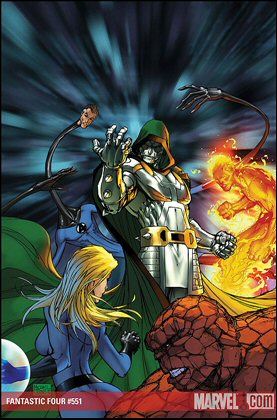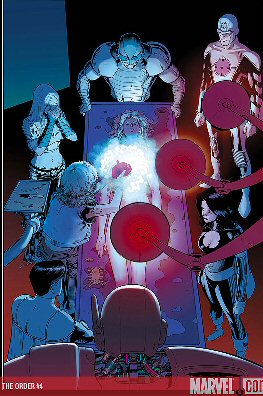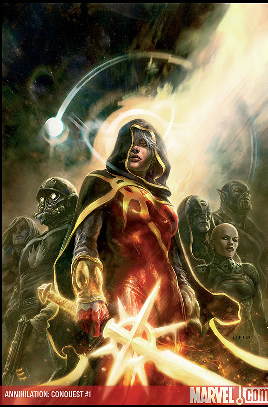|
This
Week In Marvel 11/06/07
brought to you by Illusive
Comics and Games of Santa Clara
With certain rare exceptions, reading Marvel
Comics these days fills me with ambivalence. On one hand,
the stories explore superhero tropes into pretty logical
and often unheroic conclusions. On the other hand, the characters
doing it are children's heroes, licensing goldmines being
bent and twisted beyond recognition before the status quo
can be, must be, restored.
Case in point - Dwayne McDuffie getting
handed the Fantastic Four after Civil War pushed
them apart in ways that seemed irrevocable. In a logical
world, sorry, this superteam would be permanently dissolved
- that's one of the ramifications of a Civil War.
Reed Richards created 100 Plans to make
a better tomorrow, among them the Registration Act, the
cloning of Thor and the building of an inhumane prison within
the Negative Zone. After causing the death of Bill Foster,
Reed found himself abandoned by his wife and rejected by
the rest of his teammates. Pretty logical consequences,
easily dissolved by a visit from the Black Panther and some
time spent playing "Hide the Dyson Sphere" with Sue on Titan.
Though forced to return things to the status
quo, with Fantastic Four #551 McDuffie proves
that Reed's actions don't sit well with him, either. He
calls this arc "the Beginning of the End," and sure, it
won't really be that, but it's also continuing to call Reed
to task for a mind-set that could easily become true evil,
done with all the best intentions.
As fun as all the Black Panther stuff had
been, and it was more fun than it should have been, it's
good to see the book re-focus on Marvel's First Family.
Maybe McDuffie can make some changes stick without rendering
our heroes unrecognizable or worse, unlikeable. Save that
for Namor, kids.
Of course, another consequence of Civil
War is that wacky Initiative, out of which we have several
books that look to be very riveting extended mini-series,
but will wear out their welcome if Marvel extends them past
the point of their first stories. Matt Fraction has rapidly
proven himself Marvel's best new writer, shouldering aside
the surprisingly tepid Robert Kirkman with dynamite work
on diverse titles.
The Order #4 explores some
positive results of the Civil War, but with this issue,
Fraction delves a little deeper and darker. Each issue has
focused on a different new character, and has had some really
clever insights into human nature forced into the superhuman.
But these characters also have expiration dates for their
powers, and if the book is meant as an ongoing, that could
get sticky when it comes to maintaining a chronology within
the Marvel Universe.
Because for the most part these are characters
we don't know, The Order has been one of the books
I feel better about. There's a freedom here, and Fraction
doesn't abuse it. Instead, with Barry Kitson doing some
of the best work of an already great career, he's creating
a memorable, entertaining and thought-provoking book.
Unlike Gamma Corps #4, a
misbegotten spin-off of World War Hulk. Everything
we thought we knew from the previous three issues is wrong.
Gee, is the color of surprise gamma green? While every character's
motivation seemed legitimate from earlier incarnations of
the Hulk, Frank Tieri shoehorns in Greg Pak's (admittedly
cool) revamp of the Hulk, and it's all remorse, recriminations
and renewing the Corps' dedication to justice with different
targets now. Maybe it's laying groundwork for that new red
Hulk. Or maybe it's just laying groundwork for another quarter
bin.
In another corner of the Marvel Universe,
there's been another war. Two wars, actually, not one of
them the slightest bit civil. All of Marvel's cosmic-oriented
heroes (and a few villains) put aside their differences
to stand against Annihilation, and the follow-up Conquest.
Out of that, Marvel threw together some of their more cultish
characters to be a team in Keith Giffen's redo of Starlord.
Despite annoyance at the larger event,
this book won me over. Consistent and wondrous pencils from
Timothy Green II combined with a silly yet serious team
that includes Bug from Marvel's long-gone and long-missed
Micronauts series, Our Lady of Pama Mantis and the
inexplicable but screaming for more page time Rocket Raccoon.
Led by the dissolute Peter Jason Quill, this book works.
Though the fourth issue is the last, Giffen leaves the ground
open for a lot more.
Unfortunately the main title, super-crossover
Annihilation Conquest #1, has none of the
fun. It's a lot of killing time, reminding us who the players
are, and setting up a new Adam Warlock. A couple of surprise
characters show up, but it's still too little too late.
I'm tired of the sprawl. Bring me back to characters I care
about. Though maybe now that Moondragon is actually a dragon,
she can disappear for a few years…
One character that has made a dynamic comeback
maintains its status as a great read. The Immortal
Iron Fist #10 actually features very little of Danny
Rand; instead Ed Brubaker and Matt Fraction continue weaving
a rich tapestry that the character never had before but
is now one of the most fascinating arcs at Marvel. At heart,
though, Fraction is right in the in-house interviews that
Marvel has put at the end of several books this week. It's
a billionaire who knows kung fu. What's not to like?
Can we say the same, however, about Omega
the Unknown #2? Acclaimed novelist Jonathan Lethem
and artist Farel Dalrymple have taken an infamously cultish
book from the seventies and reimagined it almost as if it
were the doodlings in some withdrawn genius kid's notebook.
Coincidentally, it's about a withdrawn genius kid
who gets confirmation of just how special he is, but not
an explanation as to why. Meanwhile there's a glory-hogging
"superhero" trying to solve the mystery of the robots that
may have raised this kid and a curiously underdeveloped
mute superman learning the ways of our lives.
Definitely borrowing heavily from Steve Gerber's original
book, Omega the Unknown is an infinite loop of a
rich inner life, the kind of comic book that comes from
a critically acclaimed novelist getting inspired by this
kind of comic book.
Hey,
write to us and let us know what you think, or talk about
it on the forums!
|








